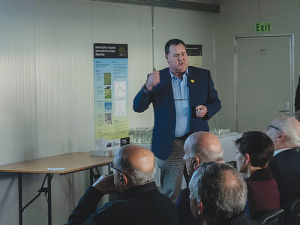Australian teams to help repair North Canterbury irrigators after storm
Moves are afoot to get a team of Australians over here to help repair North Canterbury's irrigation machinery, ravaged by the big windstorm of late October.
 Canterbury regional councillor and dairy farmer John Sunckell talks about the Central Plains Water Scheme during Dame Patsy Reddy’s visit.
Canterbury regional councillor and dairy farmer John Sunckell talks about the Central Plains Water Scheme during Dame Patsy Reddy’s visit.
The lower Selwyn Te Waihora catchment’s aquifers and waterways have enjoyed “incredible recharge” since the Central Plains Water scheme came on stream.
This is the message from Leeston dairy farmer and Canterbury Regional councillor John Sunckell.
The scheme, which allows farmers between the Waimakariri and Rakaia rivers to irrigate with surface water instead of groundwater, initially came on-stream during Canterbury’s two years of severe drought. But even in the face of drought it allowed monitoring bores to hold their levels, said Sunckell.
“Then in this past 16 months, where it’s got wetter and wetter we’ve had incredible recharge. The rivers are flowing, the Selwyn’s had more bloody water in it than I can almost remember in a lifetime, and I’ve been around for a while now,” said the third-generation dairy farmer.
Lowland streams are back up, and Sunckell said bores on his farm were flowing in March, which he had never seen before.
Although recent weather had been a big factor, Sunckell believed the Central Plains scheme would have done the job, albeit more gradually, had the weather stayed on the dry side.
“We’ve got those groundwater aquifers back up to where they should be and if all our science is correct we should now hold, with Central Plains coming into gear.”
The Governor-General, Dame Patsy Reddy, recently toured the district with stakeholders including tangata whenua, ECan and Lincoln University academics.
Her visit ended with presentations at Lincoln’s Ashley Dene dairy research farm, where speakers outlined the district’s environmental challenges as well as research developments especially in monitoring and mitigating farm pollution.
Sunckell told the gathering that Central Plains had become a cornerstone of the community’s move towards improving the environment.
He said stage one had transferred about 80 million cubic metres of water from groundwater to surface water and saved water takes.
“That’s the equivalent of two Wellington Harbours of water that was not extracted from the ground. And our monitoring at the bottom of the catchment was showing that we had an immediate effect on groundwater.
“And with the last couple of years we’ve had, we’ve seen our springs flowing, our streams flowing, and all those things we were looking to achieve we are beginning to achieve.
“So there’s a message from me in this: irrigation is painted as bad by some; for us there is a whole bunch of benefits,” said Sunckell.
“We have the environmental outcomes of restocking those aquifers, boosting them up, getting our open streams and springs running. We have the environmental impact of planting and riparian management.
“When we talk about irrigation it’s not just irrigation for productive values, it’s for total environment.”
Sunckell served on the local zone committee before his election to the council. He said the committee always recognised two options for getting streams flowing again: augmentation from the Central Plains scheme or a 75% reduction in irrigation takes which would have decimated the whole rural economy.
“When I started on the zone committee the target was to restore the mauri of Te Waihora while maintaining the prosperous land-based economy and thriving communities.”
Former Fonterra executive Alex Turnbull has been appointed CEO to lead all five Yili Oceania Business Division companies in New Zealand.
Fonterra executive René Dedoncker is leaving the co-operative later this year to lead Australian agribusiness Elders.
Alliance Group and the Southland Stags rugby team have joined forces in a partnership that will see the the meat co-operative's farmgate brand feature on players' team kits and replica jerseys.
Fonterra's plan to expand its organic programme to the South Island is being well received by farmers, the co-op says.
Voting has started for the renewal of DairyNZ's milksolids levy.
The most successful catchment groups in NZ are those that have 'a source to sea' approach.
OPINION: A dairy version of fantasy football has been launched.
OPINION: In recent weeks beaches in Auckland, Wellington and Christchurch have been unsafe to swim in because of recent heavy…